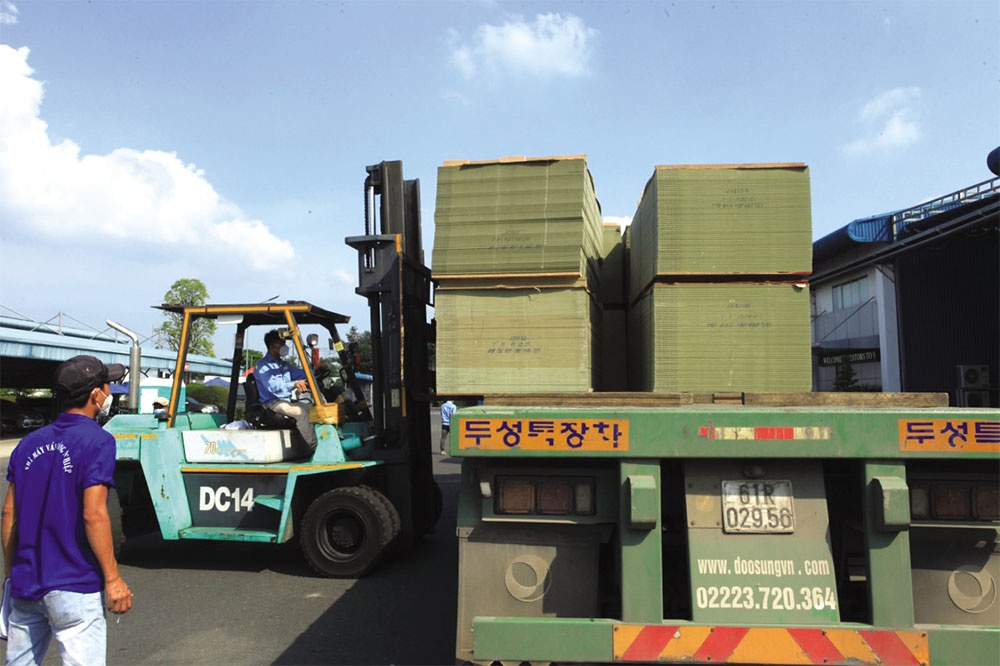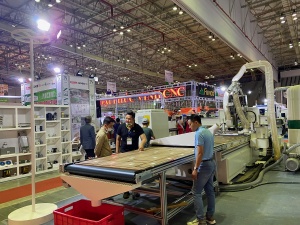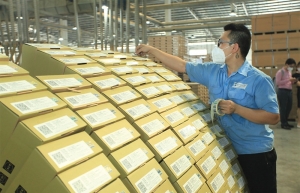VAT refund delays cause fear of bad debt for wood groups
Since May, woodchip maker Halong 12-11 JSC in the northeastern province of Quang Ninh has not been refunded VAT, with the outstanding amount reaching the threshold of $4,000.
Pham Thi Vinh, director of the company, said, “We support the state tax refunds for woodchip exporters. But now the debt is due and this is what we lend to the state in taxes.”
If the tax refund is not received, she worries, the loan could become bad debt and make her business bankrupt. The amount of VAT that has not been refunded to businesses using planted forest wood has so far reached over $400,000.
 |
| Tax refund delays are putting the pressure on some wood product exporters, photo Le Toan |
Meanwhile, more woodchip businesses fall into liquidity crises. According to the Wood Chips Association under the Association of Vietnam Timber and Forest Products (Viforest), the tax amount to be refunded to businesses in the Cai Lan Port area in Quang Ninh has reached $5,000. Given the current export scale of 15 ships per month, a ship full of woodchips for export ship worth around $4 million must pay 8 per cent tax. However, since June, no businesses have received a tax refund.
Thang Van Thong, deputy general director of Hao Hung Co., Ltd., said that the sector does not refund tax for the sole reason that enterprises cannot prove the source of input. Furthermore, the north-central province of Thanh Hoa’s Department of Tax would also require businesses to extract dash cams and monitor the path of wood from the forest.
“The export business is the last stage of the chain,” Thong said. The tax authorities have identified wood products made from domestically planted forests as items with a high risk, requiring them to strengthen inspection and coordinate with police and local authorities to verify the origin of timber.”
Last week, Viforest sent an official dispatch to the Ministry of Agriculture and Rural Development (MARD) and the Ministry of Finance (MoF), requesting to remove difficulties in confirming the origin of planted forest wood in VAT refunds.
According to Viforest, domestically planted forest wood has now become the most important raw material for Vietnam’s export wood processing industry. This supply is the foundation for the development and growth of the wood industry, contributing to the revenue of over $14 billion per year through the export wood products of the industry.
From the beginning of this year, exporting enterprises using plantation timber are facing challenges, especially in VAT refund. In the context that Vietnam’s exports of wood products to major markets such as the US, EU, and UK have been declining by 40-50 per cent, the input cash flow of businesses is blocked in the VAT refund stage, adding onto the already existing challenges.
Viforest estimates that the amount of outstanding VAT refunds to businesses using plantation timber so far has reached about $40 million, with hundreds of businesses currently not being refunded. Some have an unrefundable tax amount of up to $8 million while many others also reach $2 million. Meanwhile, tax refund regulations do not exceed 40 days.
The current inspection and supervision of enterprises would not only obstruct production and business activities of enterprises but also creates fear among the community, Viforest stated. In addition, the tax authorities’ detailed requirements for verifying the origin of wood materials are currently “inconsistent with relevant regulations under MARD’s guidance”.
To solve the current bottleneck in VAT refunds and avoid the closure of hundreds of businesses, Viforest suggested that the MARD and MoF give out specific instructions to implement timber traceability and forest product documentation during the refund process.
Do Xuan Lap, president of Viforest, said that the wood supply chain is long, going through many intermediate stages. “However, many forest growers join the supply chain informally, not complying well with state regulations. As a result, most parties do not have evidence of compliance with regulations, leading to the final issues with tax refunds.”
Vietnam has about 4.4 million hectares of planted forests. Annually, these areas are providing about 30 million cubic metres of round timber. This source of wood is an important input for businesses in areas such as furniture for export and wood products like chips, pellets, and plywood.
“As export orders of wood products decline in the US and EU markets, the input cash flow of wood enterprises is severely reduced together with the delay in VAT refunds, causing businesses to be stuck in the mud,” Lap said.
 | Wood exports reach $12.4 billion in first nine months Vietnam exported about $12.4 billion of wood and wood products in the first nine months of 2022, an increase of 7 per cent over the same period in 2021, according to the Ho Chi Minh City Handicraft and Woodworking Association. |
 | Vietnam’s wood exporters under FSC standard pressure Weak export market demand and stable freight rates rendered some wood materials imported into Vietnam cheaper. However, FSC-certified logs imported from the EU market become more expensive for Vietnamese manufacturers, forcing them to look at home-grown, certified solutions. |
What the stars mean:
★ Poor ★ ★ Promising ★★★ Good ★★★★ Very good ★★★★★ Exceptional
Related Contents
Latest News
More News
- State corporations poised to drive 2026 growth (February 03, 2026 | 13:58)
- Why high-tech talent will define Vietnam’s growth (February 02, 2026 | 10:47)
- FMCG resilience amid varying storms (February 02, 2026 | 10:00)
- Customs reforms strengthen business confidence, support trade growth (February 01, 2026 | 08:20)
- Vietnam and US to launch sixth trade negotiation round (January 30, 2026 | 15:19)
- Digital publishing emerges as key growth driver in Vietnam (January 30, 2026 | 10:59)
- EVN signs key contract for Tri An hydropower expansion (January 30, 2026 | 10:57)
- Vietnam to lead trade growth in ASEAN (January 29, 2026 | 15:08)
- Carlsberg Vietnam delivers Lunar New Year support in central region (January 28, 2026 | 17:19)
- TikTok penalised $35,000 in Vietnam for consumer protection violations (January 28, 2026 | 17:15)

 Tag:
Tag:




















 Mobile Version
Mobile Version